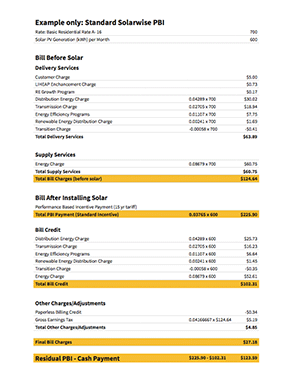EnergySage
Smarter energy decisions
Performance-based incentives, also known as PBIs, pay owners of solar energy systems for the electricity produced by their system. PBIs help solar energy panel system owners recover the costs of installing a system and earn an attractive return on their investment.
For residential customers, the PBIs take the form of a bill credit and a cash payment, and is based on the number of kilowatt-hours (kWhs) generated by the solar energy system in a given month.
The value of the PBI paid per kWh in any given month is the same, but the total PBI value varies given variability in the monthly energy production of the solar system. The PBI rate per kWh is set in the Certificate of Eligibility that a customer receives from National Grid upon approval of their application to RE Growth. This PBI rate does not change over the life of the tariff term (15 or 20 years).
To calculate the total PBI benefit each month, simply multiply the PBI tier rate by the amount of solar energy produced in a given month (in kWh). This total PBI value is then divided into a bill credit and a cash payment to customers. The bill credit is determined by multiplying the solar energy produced in a given month by several of the volume-based rates that a customer is charged on their regular utility bill. The difference between the total PBI value in a month and the Bill Credit will be the amount that a customer receives as a cash payment from National Grid. Learn more about how this is calculated.
This dual benefit of credit and payment is granted to National Grid customers every month for 15 or 20 years, depending on the term of the tariff the customer chooses. At the end of the tariff period, customers become eligible for net-metering, if applicable, where excess solar energy production (in kWh) is credited on their electricity bill against the total amount consumed each month.
Getting online solar quotes makes it easy to compare your options

View example electric bill ![]()
Example of a customer bill, along with the calculations showing how the solar energy production PBI reduces the monthly bill and produces a cash payment.
There are three calculations to consider when estimating solar earnings in the RE Growth program:
This is calculated by multiplying the total kWh of solar energy production in a given month by the customer’s PBI rate.
This is a slightly more complicated calculation. To keep it simple, it is most of the volume-based (non-fixed) generation and energy supply rates on a customer bill, multiplied by the solar energy production in kWh for that period. It does not include the energy efficiency program charge or the renewable energy distribution charge.
Customers are given a cash incentive if there is a excess PBI credit after the bill credit has already been applied. The cash payment that comes in the mail each month can be calculated by subtracting the Bill Credit from the Total PBI amount. The remaining cash payment is considered taxable income – customers should consult a tax advisor for assistance in better understanding the tax requirements associated with receiving this payment.
Whether you’re a homeowner or business owner, electricity costs can make up a large portion of your monthly expenses. With a solar panel system, you’ll generate free power for your system’s entire 25+ year lifecycle.
Solar panels aren’t an expense – they’re one of the best ways to invest, with returns rivaling those of more traditional investments like stocks and bonds.
Multiple studies have found that homes equipped with solar energy systems have higher property values and sell more quickly than non-solar homes. Demand for properties equipped with solar panel systems will continue to grow.
